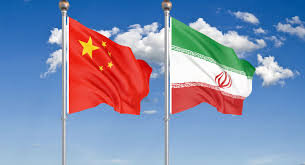NDF announces cooperation with China on foreign investment

TEHRAN – Hossein Eyvazlou, a member of the executive board of Iran’s National Development Fund (NDF), announced plans for collaboration with China in the field of foreign investment in Iran.
Speaking at a press conference on Saturday, January 4, Eyvazlou highlighted the importance of attracting foreign capital to boost Iran's economic projects, emphasizing the role of strategic partnerships with countries like China.
Details on the scope and nature of the cooperation were not disclosed, but it is expected to focus on key sectors that align with Iran’s long-term development goals.
On December 20, a Shanghai Cooperation Organization (SCO) representative announced that the Chinese investors are prepared to fund the construction of combined-cycle power plants in Iran’s energy-rich Khuzestan province to help address the country’s energy imbalance and boost regional economic development.
Zhao Bin He, the Executive Director of SCO’s Iran Office, made the remarks during a meeting with Khuzestan’s governor and local religious leaders. “We are here to pay our respects to provincial authorities and outline China’s plans for strengthening economic and trade ties, with a particular focus on Khuzestan,” Zhao said.
He highlighted the historical and enduring relationship between Iran and China, describing it as built on mutual respect, economic cooperation, and cultural exchange.
“Khuzestan’s strategic position in southwest Iran and its vast economic potential make it a key player in enhancing Iran-China relations,” Zhao added. “With access to the Persian Gulf and proximity to strong regional economies, Khuzestan offers exceptional opportunities for port infrastructure development and maritime transport.”
Zhao reiterated China’s readiness to actively participate in developing Khuzestan’s infrastructure, expanding port capacity, and exploring joint projects in energy, industry, and agriculture.
“We are also open to collaborating on sports infrastructure development in the province,” he added. “Despite sanctions, Iran has achieved remarkable progress in scientific, economic, and political arenas, reflecting the determination and capabilities of its people.”
Also in a meeting between the economic operators of Iran’s southern Hormozgan province and Cong Peiwu, China’s Ambassador to Iran, held on December 10 to explore opportunities for economic, cultural, and trade cooperation between the two nations, Mohammadreza Safa, the head of the Hormozgan Chamber of Commerce, highlighted the province’s investment potential in maritime and mining industries, saying: “We hope the challenges facing Hormozgan’s economic operators will be resolved. Our request is to facilitate visa issuance for business and tourism professionals to streamline processes.”
He emphasized the Chamber’s readiness to send trade delegations to China and welcome Chinese investors to Hormozgan.
China's Ambassador Cong Peiwu underscored the province's strategic significance for trade relations, calling Hormozgan “one of the best regions” to expand economic and investment partnerships.
“China’s economic growth, which has secured the second global ranking in recent years, benefits not only China but also other nations, including Iran,” Cong stated.
He noted that diplomatic ties, strengthened since 1971, reached a milestone with the 25-year cooperation agreement signed in 2016.
Cong highlighted the agricultural and food sectors as key areas for enhanced cooperation, stressing the potential for exporting Iranian produce, such as fruits, dried fruits, and seafood, to China.
“Chinese consumers have a strong preference for seafood, creating significant opportunities for Iranian products in the Chinese market,” he said.
Addressing educational and cultural exchanges, the envoy pointed out that Chinese universities offer favorable conditions for Iranian students, while Chinese students also show interest in studying in Iran. “The presence of Chinese students at the University of Hormozgan strengthens cultural ties,” he added.
The ambassador further emphasized maritime transportation as a vital area for cooperation, particularly through the revival of maritime trade routes known as the “Maritime Silk Road.” He described these routes as essential for bolstering sustainable trade between the two countries.
The ambassador further acknowledged external pressures on China-Iran relations, asserting their resilience. “The ties between our two countries are stronger than ever. We do not support financial warfare of any kind. The future of Iran-China cooperation is bright, with economic, cultural, and trade relations as top priorities,” Cong stated.
During the meeting, the strategic capacities of Bandar Abbas and Jask were introduced as key economic hubs, with Hormozgan officials reiterating the province’s readiness to attract Chinese investors.
The discussions laid the groundwork for further initiatives to capitalize on economic, cultural, and academic opportunities between Iran and China.
Iran and China have strengthened their economic relations in recent years, particularly through the 25-year Comprehensive Strategic Partnership Agreement signed in 2021. The deal includes cooperation in areas such as energy, infrastructure, transportation, technology, and trade, with China committed to investing billions of dollars in Iran’s key sectors.
China remains Iran's largest trading partner, with bilateral trade exceeding $14 billion in 2023. Iran exports crude oil, petrochemicals, and minerals to China, while importing industrial machinery, electronics, and consumer goods. Additionally, both countries are partners in major international frameworks, including the Shanghai Cooperation Organization (SCO) and China’s Belt and Road Initiative (BRI), which aim to enhance regional connectivity and infrastructure development.
The energy sector plays a pivotal role in Iran-China cooperation, with Chinese firms involved in developing Iran’s oil and gas fields, as well as power generation projects. Zhao’s announcement of investment plans in Khuzestan aligns with China’s broader strategy to strengthen its presence in the Middle East and help address Iran’s energy needs.
As Iran seeks to attract foreign investment despite international sanctions, cooperation with China provides a vital lifeline for its economic growth and infrastructure development.
EF/MA
Leave a Comment